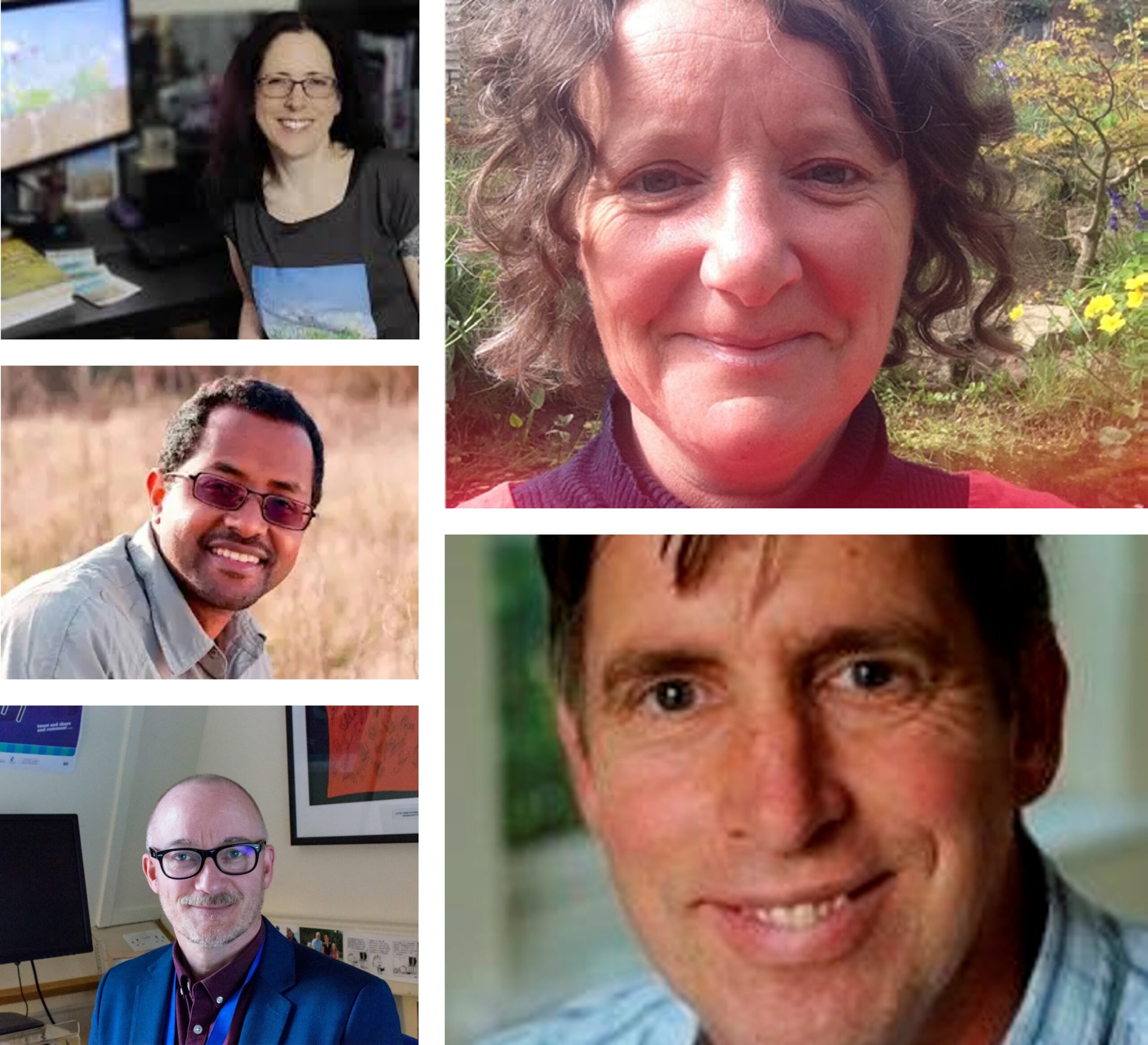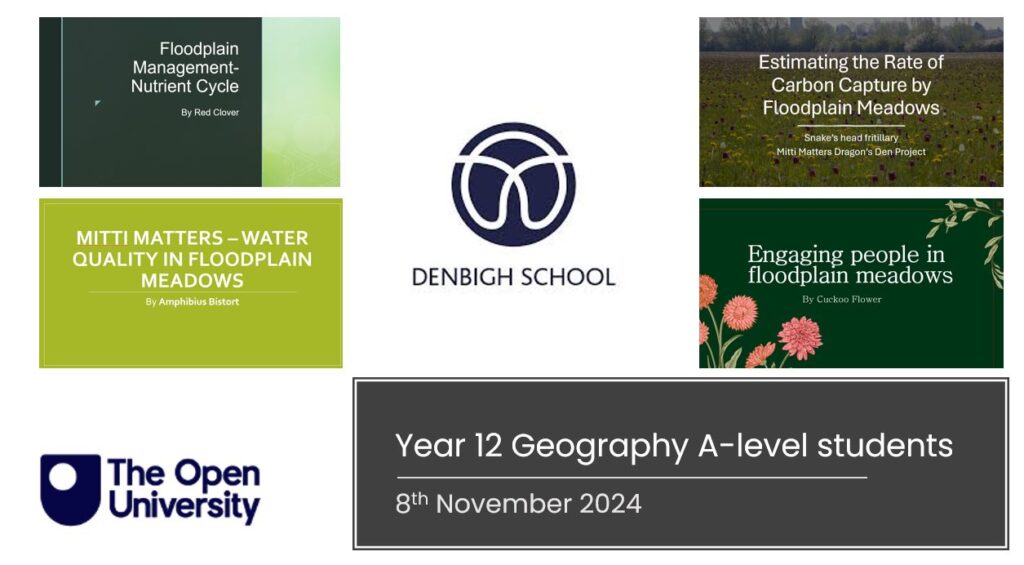Denbigh students and teachers have helped to inform future priorities for floodplain-meadows research.

Members of the Mitti Matters Team. L-R, Vicky Bowskill, Emma Rothero, Yoseph Araya, David Gowing and Richard Holliman, The Open University, UK.
Why did we engage with students and teachers from Denbigh School?
The Natural Environment Research Council, also known as NERC, funded staff from the Open University to work with practitioners, community groups and local schools, to explore an aspect of green infrastructure, floodplain-meadows research.
The project is called ‘Mitti’ Matters. ‘Mitti’ (मिट्टी), Geeta Ludhra identified this key concept during the early stages of the project. Mitti is the Panjabi word for soil. Geeta Ludhra explains the significance of mitti in more detail in this post.
NERC funded us to:
- create or develop relevant, sustainable, and equitable research partnerships and research strategies between members of the public or public intermediaries and research and researchers;
- test the feasibility of this partnership;
- facilitate co-creation and submission of a full research application to another UKRI funding opportunity with partners.
‘Co-creating’ research priorities
We addressed these objectives through engagement with a range of groups from Milton Keynes (where the Open University hosts its largest offices).
We worked with groups with interests in the management and restoration of floodplain meadows, community groups with interests in the natural environment, and those involved in formal and informal education.

Year 12 Geography students from Denbigh School in Milton Keynes, with members of the Mitti Matters team and Louise Chrisman (teacher). Photo: Richard Holliman.
We engaged with these groups with the main aim of identifying a research theme for a larger research project about floodplain meadows.
What did we do?
We engaged with Year 12 Geography students and their teacher from Denbigh School through two workshops, with roughly two weeks between them. The gap was deliberate. We wanted to give the students an opportunity to prepare for the second workshop, and it worked. The students delivered well-research and professionally-delivered presentations.
In the first of the two workshops, we explored what the students already understood about research, and introduced information about the ecosystem services that floodplain meadows provide. The students chose issues to explore in more detail, selected research priorities and then ranked them in groups and as individuals. At the end of the first workshop we introduced the challenge for the second workshop.
In the second of the two workshops, the students took control, delivering presentations in the image of the popular BBC TV format, Dragons’ Den. The students worked in teams of four to five to put together their pitches and present them in five-minute slots. The ‘dragons’ assessed the pitches for, among other things, relevance and impact.

The title slides from the presentations by the four school groups.
The focus of the pitches that the students presented included: the ‘Floodplain Management-Nutrient Cycle’, ‘Water quality in floodplain meadows’, ‘Estimating the Rate of Carbon Capture in Floodplain Meadows’, and ‘Engaging people in floodplain meadows’.
Next steps
Following the two school workshops we are organising workshops with the other external groups, including practitioners, community groups and educators. We will combine the findings from these workshops to produce an agreed set of priorities for a larger proposal. We will submit the proposal to NERC for their consideration and assessment.
Our application to fund this larger research proposal will be part of a competitive process. More proposals will fail at this next stage than will be funded. But this does not detract from the amazing contributions from students and teachers at Denbigh School.
Thank you to…
We are extremely grateful to the following contributors from Denbigh School in Milton Keynes.
Year 12 Geography Students: Isabella Augustyn, Gracie Barlow, William Blackledge, Isabelle Bonham, Connor Brooks, Lana Crabb, Aaron Davis, Elea de Keating-Hart-Windells, Ilia Grigoriadis, Finn Hart-Jones, Jack Hliton, Mbali Jama, Owen Millar, Maxwell Newnham, Penelope Rose, Alistair Shakeshaft-Ward, Utkarsh Walimbe, Daniel Wiltshire and Alice Winiarska. Two other students contributed but asked not to be named or photographed.
Teachers: We were supported in the classroom by Louise Chrisman. Emma Hanby and Jon Burgess supported planning for these activities.
The authors
This post is a work of joint authorship involving Richard Holliman, Emma Rothero, David Gowing, Yoseph Araya and Vicky Bowskill.
The authors are members of the NERC-funded Mitti Matters Project. Mitti Matters involves staff based in the Faculty of Science, Technology, Engineering and Mathematics at the Open University (also including Olivia Nelson and Sarah Davies).
Who funded us?
Mitti Matters was funded through a co-creation bursary by the Natural Environment Research Council as part of their ‘Growing Shoots’ Programme (NE/Y005635/1 _Growing Shoots).
NERC is the largest and most significant funder for research into the environmental sciences in the UK. They commission research, infrastructure and training in support of new advances in the environmental sciences.
For NERC, environmental sciences include: atmospheric physics and chemistry; climate and climate change; ecology, biodiversity and systematics; geosciences; marine environments; polar sciences; science-based archaeology; and terrestrial and freshwater environments.
